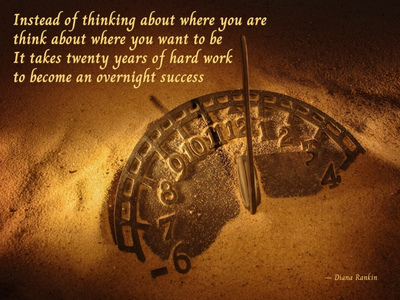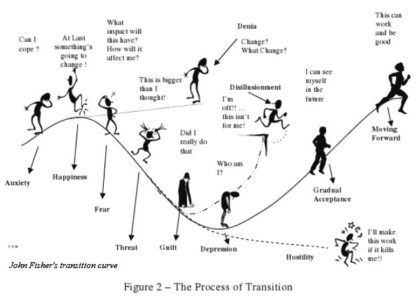Last updated on September 11th, 2024 at 04:49 pm
 If you could poke a dipstick into my “what makes me crazy” tank, it would come out dripping with one phrase: “instant dream success.”
If you could poke a dipstick into my “what makes me crazy” tank, it would come out dripping with one phrase: “instant dream success.”
Let me clarify—by “crazy,” I mean the kind of dreamers who believe that the moment they get an idea, it should immediately happen. They expect their dreams to materialize like magic right after they’ve thought them up.
My special brand of crazy really flares up when I’m helping others with their dreams. It usually hits when someone has just launched their website, blog, product, or next big thing, and they instantly start checking their watch, waiting for that million-dollar check to come flying in and smack them in the face.
“I launched, right? Isn’t that all it takes?”
It’s as if they believe that just hitting the start button on their dream (be it a website, book, weight-loss journey, or product launch) means success is about to pour down on them like a May hailstorm in Montana. Time to dust off their hands, call it a day and get ready to celebrate.
Cue the sound of screeching brakes—or me screaming.
Success simply doesn’t work that way. As much as we all wish we could be overnight successes (literally, in 12 hours), the harsh reality is that dreaming doesn’t unfold like that. Dream success takes time. Years, in fact. Success follows a winding road, a path much more aligned with the 5 Stages of Change. It’s difficult to compare one person’s success to another because the journey takes time, and everyone’s path is different. I see at least six stages to dream success—probably more—but let me walk you through the long and winding road.
The Six Stages of Dream Success
1. Contemplation
Every dream starts with the spark of an idea. You could have imagined yourself as a New York Times best-selling author when you were 8 years old, while someone else might have had the same dream at age 21, inspired by a great college professor.
Who’s going to get there first? No one knows. Dreams arrive at different stages in our lives, and some have been working on theirs much longer.
Timeframe for this stage: 4 to 60 years.
2. Information
Next, the dreamer gathers information. They might buy books, take courses, attend seminars, or dive into online research (ahem, hello, Google). They’re figuring out what it takes to succeed. If they’ve started young, this stage could be about commitment and where to find the best training. If they’re 40, they might have to learn a whole new skill set.
Timeframe for this stage: 4 to 60 years.
3. Launch
This is where the rubber meets the road. The dreamer takes that bold first step—whether it’s buying a domain, signing up for a class, or the start of a weight-loss program.
Excitement runs high, but so does fear. Many dreamers mistakenly think they should be successful right away. You know, a twenty-pound weight loss in a week. Often, they quit within the first year. (Fun fact: The average time dreamers quit is after just three months.)
Timeframe for this stage: 4 to 60 years.
4. The Dip
Borrowing from Seth Godin, the Dip describes the long slog between launch and success. The dream loses its shine, the work becomes grueling, and the fun disappears. You may even wonder if the dream is worth the hassle.
This is year three of college, halfway through writing your first book, or the crushing realization that you’re now in charge of all your own marketing.
Timeframe for this stage: 4 to 60 years.
5. Adjusting
Here’s where the dream undergoes some tweaks. You refine your manuscript, hustle to sell those 500 copies in your garage, or start taking more advanced courses to improve your skills.
This is the stage of feedback—and guess what? There will be feedback. Accept it, learn from it, and make the necessary adjustments. Otherwise, you risk getting stuck back at Stage 2.
Timeframe for this stage: 4 to 60 years.
6. Success
Finally, you hit that sweet spot where success seems within reach. There’s more work than you anticipated, but the dream is happening. Maybe you’ve booked a concert, published your book, or found your blog rising in the ranks.
This is the moment when everything goes wild. But remember—even at this stage, it’s possible to self-sabotage if you don’t feel you deserve the success.
Timeframe for this stage: 4 to 60 years.
You may notice I’ve given each stage a timeframe of 4 to 60 years. Why? Because we’re all human with unique circumstances. Some pause their dreams to raise a family, others wait for financial security, and some might wait until retirement to chase their passion. For example, a top social media influencer once told me that three years of daily posting was the golden rule for success. But lately, I’ve seen others finding success after nine years. The truth is, there are so many factors at play.
“Instead of thinking about where you are, think about where you want to be. It takes twenty years of hard work to become an overnight success.” — Diana Rankin
Can you stay with your dream, even if it takes 20 years to achieve?

Catherine Hughes is an accomplished magazine columnist, content creator, and published writer with a background as an award-winning mom blogger. She partners with companies to create captivating web content and social media stories and writes compelling human interest pieces for both small and large print publications. Her writing, which celebrates the resilience and achievements of Northern California’s residents, is featured in several magazines. Beyond her professional life, Catherine is passionate about motherhood, her son, close friendships, rugby, and her love for animals.
Note: Articles by Catherine may contain affiliate links and may be compensated if you make a purchase after clicking on an affiliate link.




